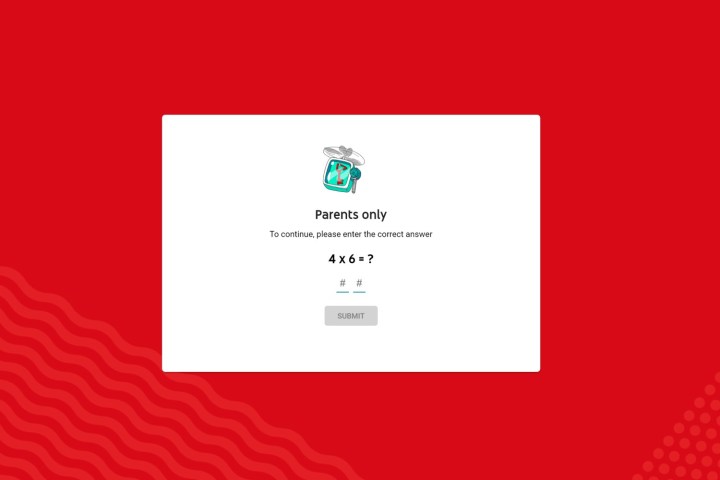
YouTube Kids officially launched Friday on the web. The website offers a similar experience to the YouTube Kids mobile app and allows parents to set limits on what content their children are able to watch on the platform.
The idea is that parents decide what children ages 12 and under and able to watch on the service and then those kids will be essentially locked out of viewing inappropriate content.
However, there’s one big issue with that age lock: to verify that you’re a parent, all you need to do is answer a basic math question that children using the service could potentially solve, essentially giving them the ability to unlock it and watch whatever they want anyway.
Independent Journal Review editor Josh Billinson highlighted the issue on Twitter. Essentially, when kids try to unlock YouTube Kid they’re faced with a question “For Parents Only” that is consistently an easy multiplication problem. While that might be slightly challenging for younger kids, children who are toward the older part of YouTube Kids’ demographic, from 8 to 12 years old, should probably be able to handle basic multiplication by now.
YouTube has locked down their new YouTube Kids platform with a state-of-the-art authentication tool to make sure kids have permission from an adult to be on the platform.
Good luck cracking this one, kids. pic.twitter.com/R01P17QlJC
— Josh Billinson (@jbillinson) August 30, 2019
Another concern: Even if a child doesn’t know multiplication, and ignoring the fact that calculators exist, making an incorrect guess at the questions doesn’t ever lock a child out — it just produces another math question. In theory, this means a kid could keep trying until they got a question they could actually answer. Or, if they kept typing in the same number, there’s a chance that the number they type will eventually be correct and grant them access.
The launch of YouTube Kids on the web comes the same day that Google agreed to pay between $150 and $200 million to resolve an FTC investigation into YouTube over alleged violations of children’s property law, Politico reports.
That issue stemmed from privacy groups claiming that YouTube collected personal information about minors and then used that information to target them with advertising without their parent’s permission.
The settlement is the largest ever made for a violation of the Children’s Online Privacy Protection Act. Previously, the highest settlement ever was $5.7 million, which was paid in February by TikTok competitor Musical.ly.
We’ve reached out to YouTube to see if it has plans to change the authentication tool and will update this post if and when we hear back.
Editors' Recommendations
- These are the 10 most-viewed YouTube videos of all time
- YouTube brings pinch to zoom and video navigation changes to everyone
- YouTube may finally loosen its rigid rules around copyrighted music
- YouTube TV may get $10 cheaper — but lose a bunch of channels
- How to try YouTube’s new video download feature for desktop




